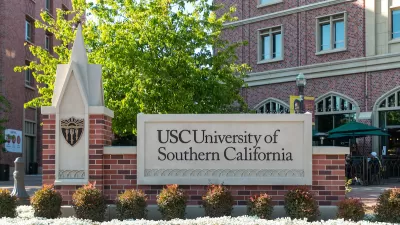Recent articles on uncomfortably loud environments in New York and Los Angeles raise an interesting question - is noise pollution a necessary part of city living or is it a health hazard that should be addressed?
The rise in attention to the impact of noise pollution on those living and working in America's biggest cities was kicked off by an article that appeared on July 19 in The New York Times detailing what reporters found when they measured noise levels at 37 restaurants, bars, stores and gyms across
the city. According to reporter Cara Buckley, "loud noise has become a fact of life in the very places where people have traditionally sought respite from urban stress" and from the sampling of establishments that The Times visited, reporters "found [noise] levels that experts said bordered on dangerous at
one-third of them."
A couple of days after the article was published, Michael Kimmelman, architecture critic for The Times, addressed the noise issue on his twitter feed: "Still shocked since returning to NY by noise pollution--subways, sirens,
restaurants. Not a sign of big city grit, but an urban blight." The next day he tweeted a follow-up, "Why is NY so glorious on summer weekends? Partly the quiet. Noise pollution is the next ecological challenge for the city."
More recently Nate Berg has published two pieces in The Atlantic Cities focused on the impact of noise on transit commuters and outdoor concertgoers in Los Angeles.
Do these articles represent a newfound sensitivity to the sounds of the city as more people embrace urban living, or a profound shift in the decibel levels city dwellers are inundated with on a daily basis? Will urban Americans raise their voices in protest of an emerging public health hazard, or will the concerns identified by the authors above be lost amongst the din of the urban news cycle?
FULL STORY: For L.A. Residents Fed Up With Helicopter Noise, a Final Straw

Alabama: Trump Terminates Settlements for Black Communities Harmed By Raw Sewage
Trump deemed the landmark civil rights agreement “illegal DEI and environmental justice policy.”

Planetizen Federal Action Tracker
A weekly monitor of how Trump’s orders and actions are impacting planners and planning in America.

Why Should We Subsidize Public Transportation?
Many public transit agencies face financial stress due to rising costs, declining fare revenue, and declining subsidies. Transit advocates must provide a strong business case for increasing public transit funding.

Understanding Road Diets
An explainer from Momentum highlights the advantages of reducing vehicle lanes in favor of more bike, transit, and pedestrian infrastructure.

New California Law Regulates Warehouse Pollution
A new law tightens building and emissions regulations for large distribution warehouses to mitigate air pollution and traffic in surrounding communities.

Phoenix Announces Opening Date for Light Rail Extension
The South Central extension will connect South Phoenix to downtown and other major hubs starting on June 7.
Urban Design for Planners 1: Software Tools
This six-course series explores essential urban design concepts using open source software and equips planners with the tools they need to participate fully in the urban design process.
Planning for Universal Design
Learn the tools for implementing Universal Design in planning regulations.
Caltrans
Smith Gee Studio
Institute for Housing and Urban Development Studies (IHS)
City of Grandview
Harvard GSD Executive Education
Toledo-Lucas County Plan Commissions
Salt Lake City
NYU Wagner Graduate School of Public Service





























